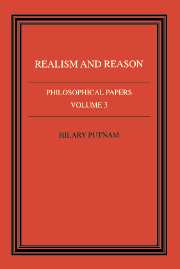Book contents
- Frontmatter
- Contents
- Dedication
- Introduction
- 1 Models and reality
- 2 Equivalence
- 3 Possibility and necessity
- 4 Reference and truth
- 5 ‘Two dogmas’ revisited
- 6 There is at least one a priori truth
- 7 Analyticity and apriority: beyond Wittgenstein and Quine
- 8 Computational psychology and interpretation theory
- 9 Reflections on Goodman's Ways of Worldmaking
- 10 Convention: a theme in philosophy
- 11 Philosophers and human understanding
- 12 Why there isn't a ready-made world
- 13 Why reason can't be naturalized
- 14 Quantum mechanics and the observer
- 15 Vagueness and alternative logic
- 16 Beyond historicism
- Bibliography
- Acknowledgements
- Index
2 - Equivalence
Published online by Cambridge University Press: 06 January 2010
- Frontmatter
- Contents
- Dedication
- Introduction
- 1 Models and reality
- 2 Equivalence
- 3 Possibility and necessity
- 4 Reference and truth
- 5 ‘Two dogmas’ revisited
- 6 There is at least one a priori truth
- 7 Analyticity and apriority: beyond Wittgenstein and Quine
- 8 Computational psychology and interpretation theory
- 9 Reflections on Goodman's Ways of Worldmaking
- 10 Convention: a theme in philosophy
- 11 Philosophers and human understanding
- 12 Why there isn't a ready-made world
- 13 Why reason can't be naturalized
- 14 Quantum mechanics and the observer
- 15 Vagueness and alternative logic
- 16 Beyond historicism
- Bibliography
- Acknowledgements
- Index
Summary
For equivalence at the level of elementary logic there is at least a complete proof procedure, even if there is no complete disproof procedure; for mathematical equivalence in general, as a consequence of the Gödel theorem, there is not even a complete proof procedure. But the notion of equivalence that is philosophically important today is not the notion of logical or mathematical equivalence, but rather the notion of cognitive equivalence of whole theories, and, in particular, of theoretical systems which are, taken literally, incompatible. It is to this topic – the cognitive equivalence of theories and conceptual systems, especially systems which are incompatible when taken at face value – that the present article is devoted.
‘Equivalence’ as a philosophical notion
For one kind of traditional realist philosopher the sort of equivalence that we are discussing does not exist at all. This is the sort of realist who believes, as Lenin did in Materialism and Empirio-Criticism, that theories are simply ‘copies’ of the world. If realism is identified with the view that there is ‘one true theory of everything’ (and exactly one), then realism is just the denial that there is a plurality of ‘equivalent descriptions’ of the world (apart from the noncontroversial case of logical or mathematical equivalence). Today, however, few if any philosophers of a realist stamp would wish to be identified with that sort of realism.
- Type
- Chapter
- Information
- Philosophical Papers , pp. 26 - 45Publisher: Cambridge University PressPrint publication year: 1983
- 15
- Cited by



